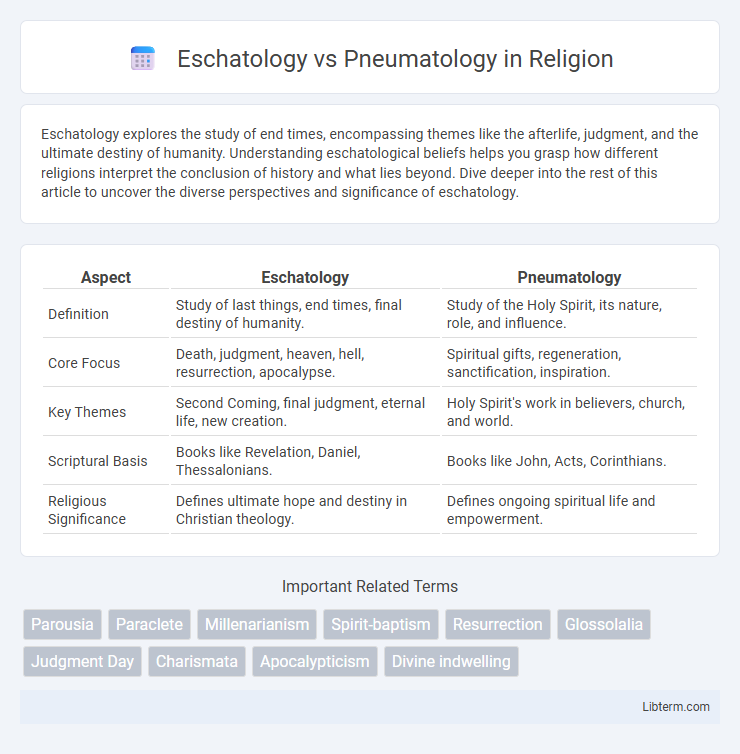Eschatology explores the study of end times, encompassing themes like the afterlife, judgment, and the ultimate destiny of humanity. Understanding eschatological beliefs helps you grasp how different religions interpret the conclusion of history and what lies beyond. Dive deeper into the rest of this article to uncover the diverse perspectives and significance of eschatology.
Table of Comparison
| Aspect | Eschatology | Pneumatology |
|---|---|---|
| Definition | Study of last things, end times, final destiny of humanity. | Study of the Holy Spirit, its nature, role, and influence. |
| Core Focus | Death, judgment, heaven, hell, resurrection, apocalypse. | Spiritual gifts, regeneration, sanctification, inspiration. |
| Key Themes | Second Coming, final judgment, eternal life, new creation. | Holy Spirit's work in believers, church, and world. |
| Scriptural Basis | Books like Revelation, Daniel, Thessalonians. | Books like John, Acts, Corinthians. |
| Religious Significance | Defines ultimate hope and destiny in Christian theology. | Defines ongoing spiritual life and empowerment. |
Introduction to Eschatology and Pneumatology
Eschatology explores the theological study of last things, focusing on concepts such as the Second Coming, judgment, resurrection, and the ultimate destiny of souls in Christian doctrine. Pneumatology examines the nature and work of the Holy Spirit, including its role in inspiration, sanctification, and spiritual gifts within the church. Both fields provide critical insights into Christian beliefs about divine intervention and the spiritual dynamics shaping human destiny.
Defining Eschatology: The Study of Last Things
Eschatology is the theological study of last things, encompassing concepts such as death, judgment, heaven, hell, and the ultimate destiny of humanity. This field explores prophetic revelations about the end times, including the second coming of Christ, resurrection, and final judgment. Pneumatology, by comparison, focuses on the study of the Holy Spirit, emphasizing spiritual empowerment and divine presence rather than end-time events.
Understanding Pneumatology: The Doctrine of the Holy Spirit
Pneumatology, the theological study of the Holy Spirit, explores the Spirit's role in divine inspiration, sanctification, and empowerment of believers, distinguishing it from eschatology, which centers on end times and final judgment. Key aspects of pneumatology include the Holy Spirit's involvement in spiritual gifts, guidance, and the ongoing presence of God within the Church and individual lives. Understanding pneumatology enriches Christian doctrine by emphasizing the transformative and sustaining power of the Holy Spirit in both personal faith and communal worship.
Historical Development of Eschatology
The historical development of eschatology traces back to ancient Judaic traditions, evolving through early Christian interpretations of prophecy and apocalyptic literature. Key milestones include the shift from immediate expectations of the end times in Second Temple Judaism to more symbolic and varied understandings in the New Testament and Patristic writings. This contrasts with pneumatology, which developed through theological reflections on the Holy Spirit's role, primarily articulated in the early church councils and creeds, emphasizing the Spirit's work in sanctification rather than future events.
The Evolution of Pneumatology in Christian Thought
The evolution of Pneumatology in Christian thought traces the understanding of the Holy Spirit from early biblical interpretations to contemporary theological frameworks, emphasizing its role in personal transformation and divine guidance. Unlike Eschatology, which centers on end-times and final judgment, Pneumatology explores the dynamic presence of the Spirit in the church, spirituality, and Christian life. This development highlights key doctrinal shifts, such as the Pentecostal movement's impact on modern charismatic expressions and the ongoing dialogue between tradition and progressive theology.
Key Themes in Eschatological Beliefs
Eschatology centers on themes such as the final judgment, resurrection of the dead, and the establishment of a new heaven and earth, emphasizing the ultimate destiny of humanity and the cosmos. It explores concepts like the second coming of Christ, the nature of the afterlife, and the fulfillment of divine promises. Pneumatology, by contrast, focuses on the study of the Holy Spirit's role in spiritual life, sanctification, and inspiration, rather than end-time events.
Major Concepts in Pneumatology
Pneumatology primarily explores the nature, person, and works of the Holy Spirit, emphasizing concepts such as spiritual gifts, the indwelling presence, and the Spirit's role in sanctification and empowerment of believers. Major themes include the baptism of the Holy Spirit, the fruit of the Spirit, and the Spirit's guidance in the interpretation of Scripture and the life of the church. While eschatology focuses on end times and final events, pneumatology centers on ongoing spiritual dynamics and divine influence in the present life of Christians.
Eschatology and Pneumatology: Points of Intersection
Eschatology and Pneumatology intersect significantly in the study of the Spirit's role in end-time events and the consummation of salvation as described in biblical theology. Pneumatology explores the work and gifts of the Holy Spirit, while Eschatology focuses on final judgment, resurrection, and the fulfillment of God's kingdom, highlighting the Spirit's involvement in empowering believers for end-time witness and transformation. This intersection emphasizes the Spirit's active presence in eschatological hope and the realization of divine promises through spiritual renewal and ultimate redemption.
Theological Debates: Contrasts and Connections
Eschatology and Pneumatology intersect significantly in theological debates, highlighting contrasts in focus--eschatology centers on end times and ultimate destiny, while pneumatology examines the Holy Spirit's role in present spiritual life. Debates often address how the Spirit's activity anticipates or enacts eschatological fulfillment, linking future hope with current experience. Key theological discussions explore the Spirit's involvement in resurrection, judgment, and the inauguration of God's Kingdom, bridging these doctrines within systematic theology.
Contemporary Relevance of Eschatology and Pneumatology
Eschatology, the study of end times and final cosmic events, remains relevant today by shaping ethical frameworks and influencing contemporary theological discourse on hope and justice. Pneumatology, the study of the Holy Spirit, impacts modern Christian practice through its role in spiritual renewal, empowerment, and communal transformation. Both fields contribute significantly to understanding faith's role in addressing current social and existential challenges.
Eschatology Infographic

 libterm.com
libterm.com